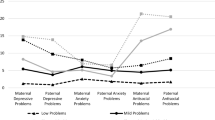Abstract
The relationship of parent personality to child psychopathology has been investigated in numerous MMPI studies over the past three decades. Very few of these studies, however, have directly analyzed MMPI response patterns of both parents and offspring. The current study included the MMPI responses of 199 families with adolescents entering inpatient and outpatient psychiatric settings (N=542 Inpatient parents and adolescents had significantly higher mean scores across a variety of MMPI scales than did their outpatient counterparts. The linear combination of adolescent and maternal MMPI scale data, in a stepwise discriminative function analysis, resulted in accurate classification of 75% of all children in inpatient treatment and 74% of all children assigned to outpatient treatment. Findings were discussed in terms of salient MMPI differences between inpatient and outpatient families and shared psychopathological characteristics among family members with offspring in psychiatric treatment settings.
Similar content being viewed by others
References
Archer, R. P. (1984). Use of the MMPI with adolescents: A review of the salient issues.Clinical Psychology Review, 4, 241–251.
Archer, R. P., Sutker, P. B., White, J. L., & Orvin, G. H. (1978). Personality relationships among parents and adolescent offspring in inpatient treatment.Psychological Reports, 42, 207–14.
Bell, R. Q. (1979). Parent, child and reciprocal influences.American Psychologist, 34, 821–826.
Butcher, J. N., & Messick, D. M. (1966). Parent-child profile similarity and aggression: A preliminary study.Psychological Reports, 18, 440–442.
Dahlstrom, W. G., Welsh, G. S., & Dahlstrom, L E. (1972).An MMPI handbook: Volume 1. Minneapolis: University of Minnesota Press.
Erickson, M. T. (1969). MMPI profiles of parents of yound retarded children.American Journal of Mental Deficiency, 73, 728–732.
Hafner, A. J., Butcher, J. N., Hall, M. D., & Quast, W. (1969). Parent personality and childhood disorders: A review of MMPI findings. In J. N. Butcher (Ed.),MMPI: Research developments and clinical applications (PP. 181–189). New York: McGraw-Hill.
Hill, M. S., & Hill, R. N. (1973). Hereditary influences on the normal personality using the MMPI: Age-corrected parent-offspring resemblances.Behavior Genetics, 3, 133–144.
Goodstein, L. D., & Rowley, V. N. (1961). A further study of MMPI differences between parents of disturbed and nondisturbed children.Journal of Consulting Psychology, 25, 460.
Lachar, D., & Sharp, J. R. (1979). Use of parents' MMPI in the research and evaluation of children. In J. N. Butcher (Ed.),New development in the use of the MMPI (pp. 203–240). Minneapolis: University of Minnesota Press.
Larzelere, R. E., & Mulaik, S. A. (1977). Single-sample tests for many correlations.Psychological Bulletin, 84, 557–569.
Lauterbach, C. G., Vogel, W., & Hart, J. (1962). Comparison of the MMPI of male problem adolescents and their parents.Journal of Clinical Psychology, 18, 485–487.
Liverant, S. (1959). MMPI differences between parents of disturbed and nondisturbed children.Journal of Consulting Psychology, 23, 256–260.
Marks, P. A. (1961). An assessment of the diagnostic process in a child guidance setting.Psychology Monographs, 75 (3, Whole No. 507).
Mlott, S. R. (1972). Some significant relationships between adolescents and their parents as revealed by the Minnesota Multiphasic Personality Inventory.Adolescence, 7, 169–182.
Smith, P. E., Burleigh, R. L., Sewell, W. R.,& Krisak, J. (1984). Correlation between the Minnesota Multiphasic Personality Inventory profiles of emotionally disturbed adolescents and their mothers.Adolescence, 19, 31–38.
Sopchak, A. L. (1958). Spearman correlations between MMPI scores of college students and their parents.Journal of Consulting Psychology, 22, 207–209.
Sperling, M. (1970). The clinical effects of parental neurosis on the child. In E. J. Anthony & T. Benedek (Eds.),Parenthood: Its psychology and psychopathology (pp. 639–669). Boston: Little, Brown.
Spitz, R. A. (1970). The effects of personality disturbances in the mother on the well-being of her infant. In E. J. Anthony & T. Benedek (Eds.),Parenthood: Its psychology and psychopathology (pp. 501–524). Boston: Little, Brown.
Wolking, W. D., Quast, W., & Lawton, J. J. (196). MMPI profiles of the parents of behaviorally disturbed children and parents from the general population.Journal of Clinical Psychology,22, 39–48.
Author information
Authors and Affiliations
Additional information
We gratefully acknowledge the support of Dr. George Orvin, Dr. David Reid, and Dr. Robert Vidaver in the collection of the data used in this study, and the assistance of Joan Zanella in the preparation of this manuscript.
Rights and permissions
About this article
Cite this article
Archer, R.P., Stolberg, A.L., Gordon, R.A. et al. Parent and child MMPI responses: Characteristics among families with adolescents in inpatient and outpatient settings. J Abnorm Child Psychol 14, 181–190 (1986). https://doi.org/10.1007/BF00917232
Revised:
Issue Date:
DOI: https://doi.org/10.1007/BF00917232




